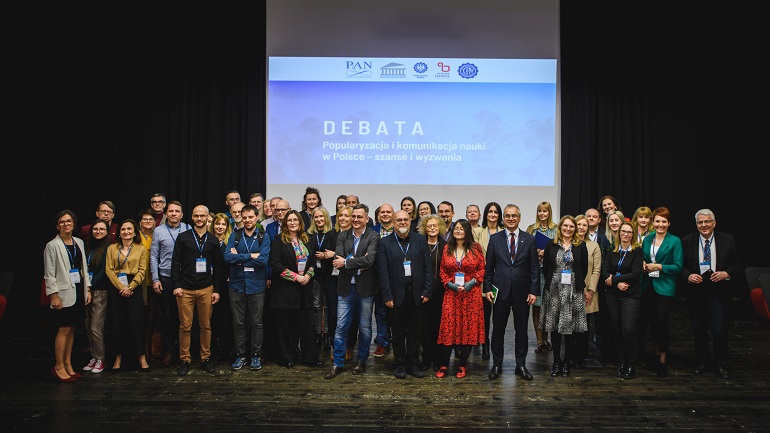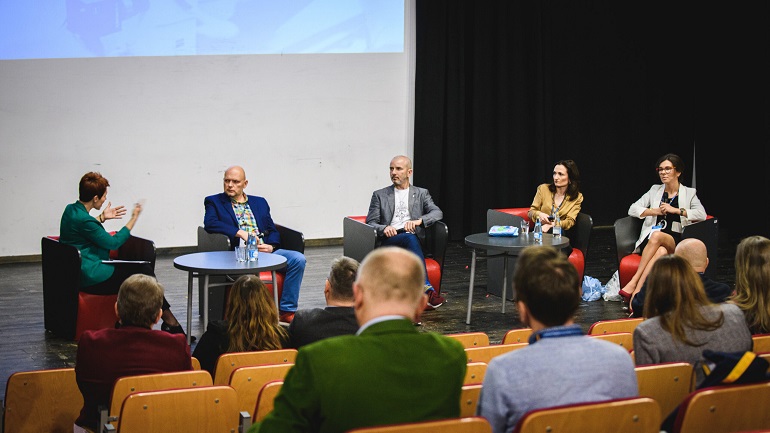Start - Aktualności - On the popularization and communication of science in Poland – a debate with the participation of science popularisers, journalists and representatives of higher education

On the popularization and communication of science in Poland - a debate with the participation of science popularisers, journalists and representatives of higher education
What is the state of popularization of science and scientific communication in Poland? What should these activities look like? What needs to be done to implement the related plans? These questions became the starting point for the discussion during the debate "Popularization and communication of science in Poland - opportunities and challenges", which took place on March 27th in Gliwice.
The state of popularization and communication of science, the current forms of these activities, as well as the challenges and opportunities they bring, became the starting point for the debate organized on March 27th by the Science Popularization Centre of the Silesian University of Technology and the Council for the Dissemination of Science of the Polish Academy of Sciences. The debate was attended by 12 experts: representatives of the academic community, popularisers of science and the media. The participants present at CKS "Mrowisko" also joined the open discussions. The debate was attended by representatives of over 20 units from all over Poland: communication and PR offices, universities, science centres, research units, as well as enterprises.
The debate "Popularization and communication of science in Poland" was started by dr hab. Aleksandra Ziembińska-Buczyńska, prof. SUT, and prof. dr hab. Tomasz Szapiro.
The first topic discussed during the meeting was the profession of science populariser. These issues were discussed by the speakers of the first panel, moderated by dr hab. Aleksandra Ziembińska-Buczyńska, prof. SUT;
- dr Tomasz Rożek (I like science),
- Michał Szydłowski (Mr. Korek Laboratory),
- Elżbieta Woda (Labiq, Science Advocates Association),
- Natalia Osica (pro science).

Participants discussed their activities and ways of disseminating knowledge, as well as reaching recipients. In addition, they discussed the possibilities of defining the profession of science populariser.
The discussion also covered an important aspect of activities related to the dissemination of knowledge and scientific communication - cooperation between scientists and journalists. The panel also discussed issues related to the role of science journalism and the creation of information devoted to the activities of scientists. The panel "Science and media" was attended by:
- Anna Ślązak (Science in Poland, scientific editorial office of PAP),
- Piotr Kieraciński (Academic Forum),
- Jarosław Juszkiewicz (Silesian Planetarium),
- Katarzyna Głuch-Juszkiewicz (Polish Radio, podcast "Learning every day").
Universities - apart from tasks related to their two missions: research and teaching - undertake cooperation with the socio-economic environment. Informing about the activities of the academic community could not take place without the developed strategies of scientific communication, allowing, among others, to reach to the inhabitants of the region, entrepreneurs and non-governmental organizations. More and more research units and universities also take specific actions to popularize science in a way tailored to different recipient profiles. For example, communication channels or tools, which include publications in social media, podcasts or video blogs, run by communication centres or press offices of universities and research centres, serve this purpose.
The guests of the panel "Academic popularization of science" were:
- Arkadiusz Mężyk (the Rector of the Silesian University of Technology and chairman of KRASP),
- Iwona Hofman (President of the Council of Scientific Societies of the Polish Academy of Sciences),
- Paweł Golik (chairman of the Council for the Dissemination of Science of the Polish Academy of Sciences),
- Anna Korzekwa-Józefowicz (communications expert, National Science Centre).
The debate "Popularization and communication of science in Poland" was an opportunity to summarize the current activities in the field of dissemination of knowledge and scientific communication, as well as to determine what science popularisers, journalists and representatives of universities will have to face in the near future. It was also an opportunity to exchange experiences and good practices and to look at the tasks undertaken by various units involved in the popularization of science from a broader perspective.








